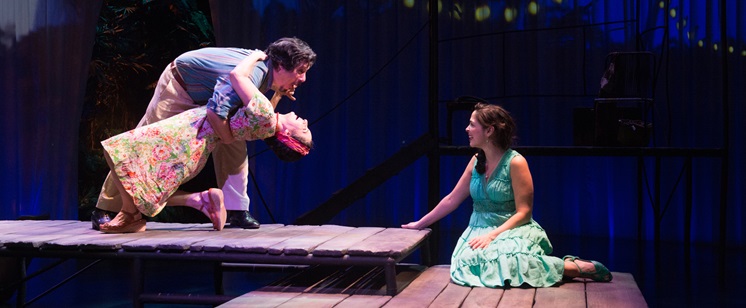
The Oregon Shakespeare festival did everything in their power to turn a dull play into a wonderful spectacle. And while their efforts didn’t go unnoticed, “The River Bride,” written by Marisela Treviño Orta, was still predictable, slow, and clichè.
That’s not to say the play was entirely a misfire, however. There were admirable moments in the writing and storytelling. But they were few and far between. For every moment of clever and profound dialogue, it was bogged down by moments of unrealistic character development, and contrived plot advancing tropes: characters walking in on a conversation about them and hearing something hurtful, characters finding true love over a weekend, and characters caught in a love triangle. We’ve seen it all before.
For instance, two of our leads, Helena and Duarte, had little to no chemistry, and in fact, said only a couple lines to each other, until it was revealed that, and I don’t consider this a spoiler as this plot point is stated in the OSF overview of the play, Helena and Duarte actually loved each other the whole time. It felt weak and unbelievable. It served only to add artificial drama between the sisters Helena and Belmira.
However, something positive about the play is its clever reconstruction of the old, amazonian folklore of the river dolphins. Writer Marisela Treviño Orta added some of her own touches to the old wives tales, and made for some intriguing developments between two of our characters, I won’t say who. And the dialogue, overall, did feel natural. Each character had their own voice, and was distinct from the rest.
OSF really got creative with the staging of the play, too. The creative team used a projection background that parallaxed with the characters as they moved from one side of the stage to the other, giving the illusion of depth and vastness to the environment. The platforms on the stage were movable and would glide across the stage as if floating on water, I wasn’t sure how they were doing it. The lighting department really pulled each scene together as well, lending dramatic cues with strong colors, or shining soft blue lights for relaxing, sombre scenes.
It’s been said that good stage direction is the stage direction you don’t notice. But it’s stage direction like this that makes me beg to differ. I couldn’t help but notice the amazing ambiance and mood the stage itself was able to lend to the play. It helped to completely immerse me into this humid, lush, little town alongside the river.
If you are familiar with this play, and enjoy this play, then you will absolutely love OSF’s performance of it. In comparison to other adaptations I’ve seen, The Oregon Shakespeare festival has outdone them all. However, if a slower, dramatic love story based on mystical folklore doesn’t quite interest you, then even with OSF’s best efforts, this play probably won’t win you over.



